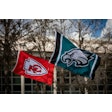Copyright 2017 Boston Herald Inc.
All Rights Reserved
The Boston Herald
Pyeongchang lies in mountainous terrain at the uppermost eastern corner of South Korea, about an hour from the border with North Korea. Normally, its proximity to the demilitarized zone, and the North beyond, would not be an issue.
But six months from now, thousands of athletes from around the world are set to gather at that remote location for the 2018 Winter Olympics.
Given the escalated tensions in the region — with North Korea testing ballistic missiles and threatening attacks on the U.S. and President Trump threatening "fire and fury" — Pyeongchang's location has become a global concern.
Though the International Olympic Committee hasn't reacted to the battle of words between Trump and North Korea's Kim Jong Un, it clearly is listening.
"We are monitoring the situation on the Korean peninsula very closely," an IOC spokeswoman said.
Much can change, either good or bad, as the clock ticks down to the opening ceremony Feb. 9. This isn't the first time the Olympic movement has butted up against politics or possible violence. No matter how often IOC leaders talk about "the autonomy of sport," the real world keeps intruding.
"The Games have always been politicized," said Michael Heine, director of the International Center for Olympic Studies in Canada. "From Mexico City to Beijing to Berlin, there are plenty of examples."
The 1916 Summer Olympics — scheduled for Berlin — were scratched due to World War I. World War II forced the cancellation of the games in 1940 and 1944.
Palestinian terrorists raided the athletes' village during the 1972 Munich Olympics, a siege that led to the deaths of 11 Israeli team members. At the 1996 Atlanta Games, a bomb exploded in a downtown park, killing two. Before the 2016 Rio de Janeiro Games, the Zika virus outbreak was declared a global health emergency. In those cases, the Games went on. But experts wonder if the Korean crisis might be different. Heine asked: "Will there be a tipping point? Could the Games be moved or postponed at this late date?"
North Korea has demonstrated expertise in cyberattacks that might allow it to cause havoc during the 17-day games.
"They might have the capability to turn the lights out for an hour. Not to hurt anybody but to show they can keep this thing from coming off smoothly," University of California professor Steven Weber said.
Read More of Today's AB Headlines
Subscribe to Our Daily E-Newsletter
Terms and Conditions Privacy Policy



































